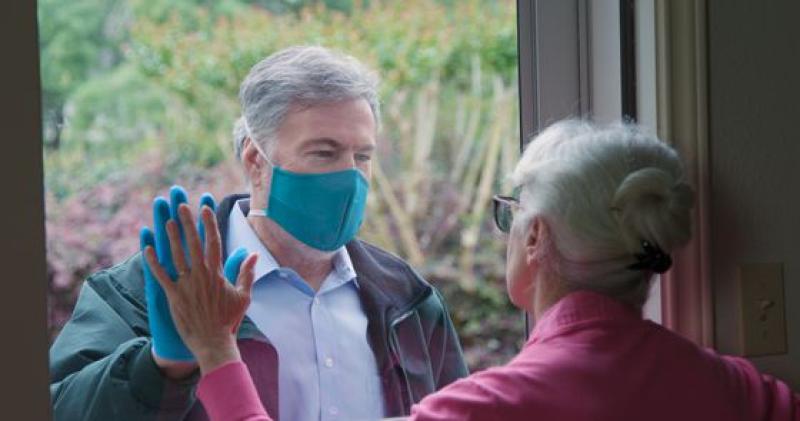What happens when humans aren't allowed to touch each other? | MNN - Mother Nature Network
Category: Entirely New
Via: tig • 6 years ago • 0 commentsBy: Christian Cotroneo (MNN - Mother Nature Network)



We're human Lego blocks, built to interlock.
 Christian Cotroneo April 20, 2020, 4:23 p.m.
Christian Cotroneo April 20, 2020, 4:23 p.m.
Tweet
 We lose a lot when we can't physically touch someone. (Photo: JHDT Productions/Shutterstock)
We lose a lot when we can't physically touch someone. (Photo: JHDT Productions/Shutterstock)
One of the prevailing theories about why the handshake emerged as a form of greeting thousands of years ago was to prove neither party was carrying a weapon.
But these days, it seems moot, considering the real weapon isn't in our hands, though it might be on them.
That's a pretty compelling reason why humans need contact — handshakes, hugs and heaven forbid, kisses — is highly frowned upon during a pandemic. But what price do we pay for being physically disconnected from one another? After all, humans were designed to interlock in one way or another, like a newborn baby clinging to a finger.
As adults, physical contact "solidifies something — an introduction, a salutation, a feeling, empathy," Michelle Fiordalis writes in a New York Times essay.
These days in particular, that last quality — empathy — is especially vital. We can be isolated from another, but we have to be able to feel a sense that we're all weathering this storm together. How do we create that sense of a shared experience when we can't touch one another?
Touch conveys emotion
 A simple touch can convey a lot of information. (Photo: fizkes/Shutterstock)
A simple touch can convey a lot of information. (Photo: fizkes/Shutterstock)
As a recent experiment led by Berkeley professor Dacher Keltner points out, we literally make connections through our fingertips. Keltner and his colleagues put a barrier between two people. They asked one of those people to convey different emotions through a one-second touch of the other person's forearm. That other person had to guess the emotion.
Here's how Keltner describes the results:
"Given the number of emotions being considered, the odds of guessing the right emotion by chance were about eight percent. But remarkably, participants guessed compassion correctly nearly 60 percent of the time. Gratitude, anger, love, fear — they got those right more than 50 percent of the time as well."
A fundamental human need
 A man and a woman hug each other while sitting down (Photo: freestocks.org [CC by 1.0]/Flickr)
A man and a woman hug each other while sitting down (Photo: freestocks.org [CC by 1.0]/Flickr)
Touch also plays another even more pivotal role in our lives. It literally provides pain relief, something we could right about now. People are dying. Funerals for loved ones are no longer possible, never mind the hugs or hand-holding or any commiseration at all.
These days, we're starving for the most fundamental human needs: to touch and to be touched. Is a hug too much to ask?
America's top infectious disease expert thinks so.
At the onset of the pandemic, Dr. Anthony Fauci, America's top infectious disease expert, only "half seriously" suggested we may never shake hands again.
Fauci is probably right. The handshake has outlived its social usefulness. It's now more laden with potential threats than a hidden dagger could ever be. But we've already discovered other ways to physically connect with a stranger — a well-timed elbow bump, for example.
 In time, the elbow bump may become the new handshake — but we're not there yet. (Photo: Linda Bestwick/Shutterstock)
In time, the elbow bump may become the new handshake — but we're not there yet. (Photo: Linda Bestwick/Shutterstock)
Because, whether it's hands, or bodies or lips, we're human Lego blocks — built to interlock. And as soon as we get the chance, we'll make up for lost time.
And if you're lucky enough to be in lockdown with someone you love, what are you waiting for?
"Most people want to feel understood and communication is the vehicle by which they transmit understanding and empathy," David Klow, a marriage and family therapist, tells PsychCentral. "Non-verbal communication can be a very powerful way to say to your partner, 'I get you.' Cuddling is a way of saying, 'I know how you feel.' It allows us to feel known by your partner in ways that words can't convey."
Related on MNN:  An etiquette guide to surviving a pandemic
An etiquette guide to surviving a pandemic  Tips from an introvert on how to enjoy being alone during coronavirus
Tips from an introvert on how to enjoy being alone during coronavirus  Horses and dogs share universal play language Related topics: Family Activities, Health & Well Being, Mental Health, Viruses & Diseases What happens when humans aren't allowed to touch each other? Without human touch, we lose one of our most effective ways to empathize with one another.
Horses and dogs share universal play language Related topics: Family Activities, Health & Well Being, Mental Health, Viruses & Diseases What happens when humans aren't allowed to touch each other? Without human touch, we lose one of our most effective ways to empathize with one another.
